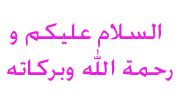 Safiyyah bint Huyayee
Safiyyah bint Huyayee 
Safiyyah bint Huyayee was the favourite daughter of Huyayee bin Akhtab the chieftain of the tribe of Banu Nadheer. Her mother was Barah bint Shamwal who was the sister of Rafa'ah in Shamwal. She was married to Salam bin Mashkam first, but they separated soon on grounds of incompatibility. Her second husband was Kananah bin Rabi' bin Haqeeq who was killed in the Battle of Khaibar, she was taken as a prisoner of war. One of the Companion, Dahyah Kalbi

asked the Prophet

for a slave girl, and he gave him the freedom to choose for himself. He chose Safiyyah. The others suggested that since she was the chieftain's daughter he should keep her for himself and give some other slave to Dahyah Kalbi

. The Prophet

did as they suggested; then he decided to free her and married her.
There is another tradition too. Wahshi bin Harb

narrates how the Prophet

asked for their opinion about Safiyyah. They told him that she would be more suitable for him and better than any of the others. So he freed her and took her hand in marriage.
Seerat Ibn Hisham, Dalai1 An-Nabuwwah by Baihaqi and Dalail An¬Nabuwwah by Asbahani - all recorded what Safiyyah

had to say about her life before her marriage to the Prophet

Her father and her paternal uncle, Abu Yasir, loved her deeply and they used to live in Al-Madinah. When the Prophet (Sallallahu Alayhi wa Sallam) migrated and carne there he first stayed in the valley of Banu ‘Amr bin 'Auf, both her father and her uncle went to see him. On their return both looked tired, fed up and disappointed.
They did not pay any attention to her, which was very unusual for her. She became anxious over what could possibly have happened. Her uncle asked her father if this was the same man. He swore by God that it was certainly the same man. Her uncle wanted to confirm again if it really was the same man, and if he had recognized him. Again her father replied in the affirmative. Then her uncle asked him for his sincere opinion about the stranger. Her father answered that he would always treat this man as a foe. Safiyyah heard this cryptic conversation filled with malice and vindictiveness and was shocked.
Time passed and the Treaty of Hudaibiah was signed. When the Prophet

returned after that the Quraish prevented them from entering Makkah. The news spread like wildfire through the whole of the Arabian Peninsula that the Muslims had bowed down and accepted an unfair treaty. People thought they had weakened, were desperate and fast losing hope. When the Jews in Khaibar heard this news, they thought this was the appropriate moment to strike and started preparing to attack Al-Madinah. They invited all the Jews in the surrounding areas to join forces with them. When the Prophet

heard about the warlike preparations of the Jews of Khaibar, he took with him the very same fourteen hundred people who had set out with him to perform 'Umrah but had not been allowed within the precincts of Makkah after the treaty of Hudaibiah. Women also were part of this group of pilgrims. He had returned from Hudaibiah in the month of Dhul-Hajj, and left for Khaibar with his army in the early days of the month of Muharram. When he first sighted Khaibar he ordered his army from to stop right there, and lifted his hands in supplication to Allah

Whenever he travelled, it was his usual practice to recite this prayer whenever his eyes first fell on a city.
'0 Allah, Lord of the seven heavens and all that they envelop, Lord of the seven earths and all that they carry, Lord of the devils and all whom they misguide, Lord of the winds and all whom they whisk away. I ask You for the goodness of this village, the goodness of its inhabitants and for all the goodness found within it and I take refuge with You from the evil of this village, the evil of its inhabitants and from all the evil found within it.' It was nightfall when they reached Khaibar. He camped with his forces on the plains just on the outskirts of the city. This again was a typical strategy of his; whenever he led his men to engage in battle, he planned to reach there by nightfall. But he was so principled that he would never attack the enemy at night in order to take them unawares.
The Muslim army was encamped just outside Khaibar, but the people of the city were quite unaware of this. When they woke up in the morning and started going about their usual chores, they were shocked to see a whole army encamped on their doorstep, as it were!
Soon after Fajr (early dawn) prayers, the Prophet

ordered the Mujahideen to advance and attack. The Jews of Khaibar started scattering towards their homes. When the Prophet

saw them running he called out,
Allah is Great, Khaibar is deserted, Khaibar is broken, Khaibar is destroyed and ruined!' By the Grace of Allah Almighty the Muslims triumphed and all the forts of Khaibar were taken. The father of Safiyyah, Huyayee bin Akhthab was killed in the battle of Bani Quraidhah. Her husband Kananah bin Rabi'ah bin Haqeeq was captured and killed for the crime of misgovernment. And Safiyyah

was made a prisoner of war.
Dahyah Kalbi

was given the option to choose a slave girl for himself, and he chose Safiyyah

. One of the Companion suggested that it would be better if the Prophet

kept Safiyyah

, the daughter of a leader and chieftain, for himself and gave some other slave girl to Dahyah Kalbi

So he chose the sister of Safiyyah's husband Kanana bin Rabi'ah. The Prophet

then freed Safiyyah and married her. Her dowry was her liberty, writes Hafiz Ibn Qayyam.
On the return journey to Al-Madinah, the Prophet

camped with his army twelve miles away from the city. One of the Sahabiyat, Umm Salim Ansariah

, dressed up Safiyyah

in her bridal finery.
In his book, Seerah A'lam Nubala' Imam Thahabi describes the qualities and character of Safiyyah

. He says she was noble both by birth as well as by nature; she was God-fearing, intelligent, beautiful, patient, tolerant and dignified. When the Prophet

saw the mark of an injury just above her eye, he asked her how she got hurt. She answered that she had dreamt that the moon had fallen into her lap. When she told her husband about her dream, he slapped her hard and told her that it meant she was in love with the king of Yathrib. When she married the Prophet

, Safiyyah

was just seventeen years old.
Safiyyah

traveled in the company of the Prophet

from Khaibar to Al-Madinah. She says that she never came across a person who was more refined and well-mannered than him. He was always pleasant and behaved like a perfect gentleman. When the people of Al-¬Madinah heard of his approach, they came out to greet him and his victorious army. The faces of the Muslims were glowing with pleasure, and those of the hypocrites were downcast and gloomy. All the Mothers of the believers were waiting impatiently in their apartments, longing to meet the Prophet

and congratulate him on this great victory. When word came that he married the young and beautiful daughter of the Jewish leader, Aishah

was disturbed by a twinge of feminine jealousy, which was but natural. The Prophet

also did not consider it proper to take his new bride to any of his wives' houses. He went directly to the house of Harithah bin Nu'man Ansari and stayed there. The ladies of Al-Madinah came there to meet Safiyyah

and all of them were full of praise for her.
After resting for some time the Prophet

went to his daughter Fatimah

and met his beloved grandchildren Hasan and Husain (Radhi Allahu Anhuma). After that he visited each of his wives and inquired about their welfare. He found a certain strangeness and distance in the behavior of 'Aishah

but he thought it better to ignore it for the moment. Aishah

after some time decided to visit the new bride in the house of Harithah bin Nu'man Ansari. The Prophet

then asked her for her opinion of Safiyyah

'Aishah

, still vexed by her feminine jealousy replied dryly that she had seen the Jewess. The Prophet

gently rebuked her, saying that Safiyyah

should no longer be referred to as a Jewess as she had accepted Islam.
Aishah and Hafsah (Radhi Allahu Anhuma) were very close friends and the latter was the only person in whom the former could safely confide. Actually it was the intense love that' Aishah

had for the Prophet

that made her express her emotions in this manner.









 Please check our
Please check our 






 asked the Prophet
asked the Prophet  for a slave girl, and he gave him the freedom to choose for himself. He chose Safiyyah. The others suggested that since she was the chieftain's daughter he should keep her for himself and give some other slave to Dahyah Kalbi
for a slave girl, and he gave him the freedom to choose for himself. He chose Safiyyah. The others suggested that since she was the chieftain's daughter he should keep her for himself and give some other slave to Dahyah Kalbi  Whenever he travelled, it was his usual practice to recite this prayer whenever his eyes first fell on a city.
Whenever he travelled, it was his usual practice to recite this prayer whenever his eyes first fell on a city. 

 and her uncle was Musa
and her uncle was Musa 